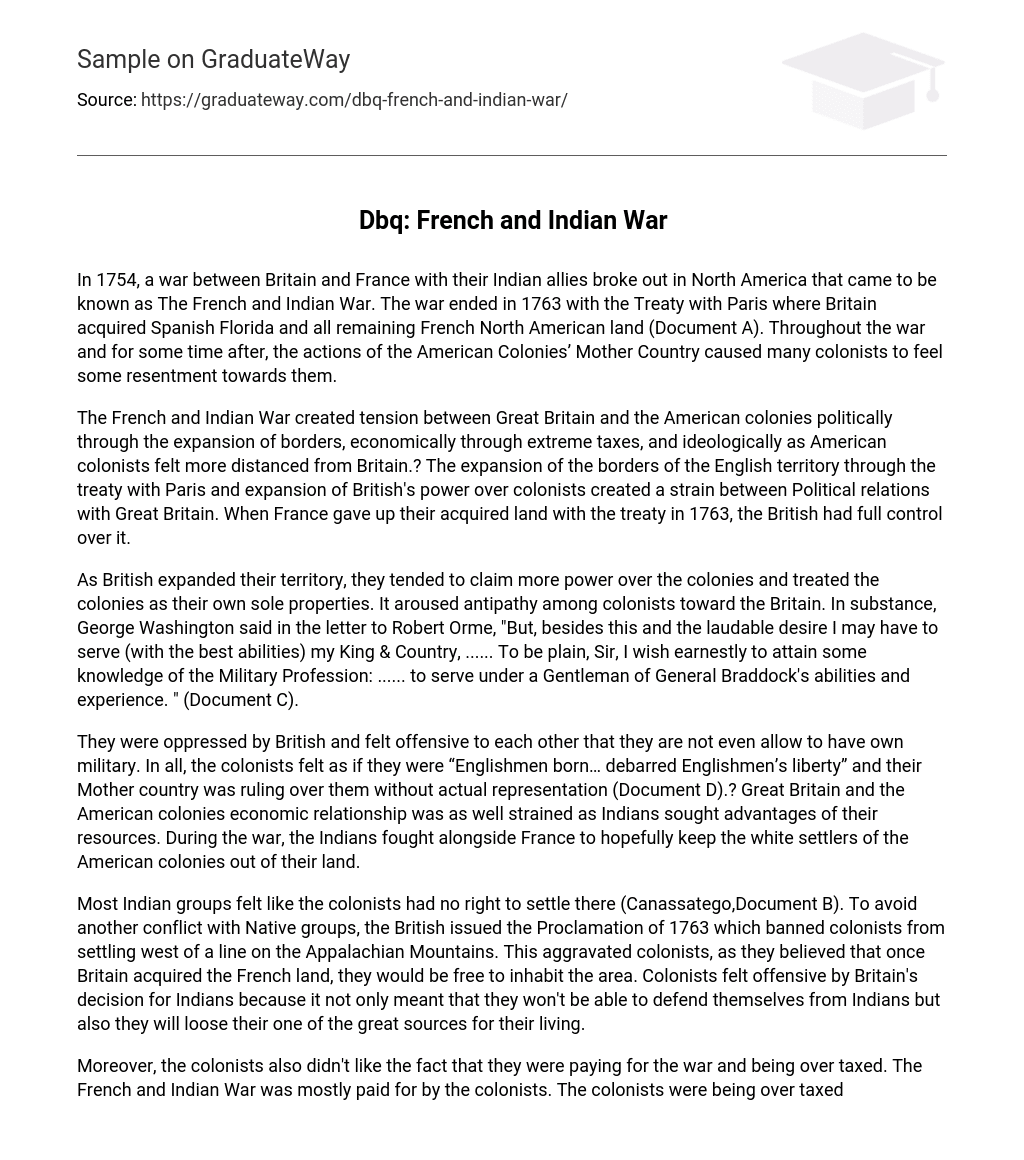In 1754, a war between Britain and France with their Indian allies broke out in North America that came to be known as The French and Indian War. The war ended in 1763 with the Treaty with Paris where Britain acquired Spanish Florida and all remaining French North American land (Document A). Throughout the war and for some time after, the actions of the American Colonies’ Mother Country caused many colonists to feel some resentment towards them.
The French and Indian War created tension between Great Britain and the American colonies politically through the expansion of borders, economically through extreme taxes, and ideologically as American colonists felt more distanced from Britain.? The expansion of the borders of the English territory through the treaty with Paris and expansion of British’s power over colonists created a strain between Political relations with Great Britain. When France gave up their acquired land with the treaty in 1763, the British had full control over it.
As British expanded their territory, they tended to claim more power over the colonies and treated the colonies as their own sole properties. It aroused antipathy among colonists toward the Britain. In substance, George Washington said in the letter to Robert Orme, “But, besides this and the laudable desire I may have to serve (with the best abilities) my King & Country, …… To be plain, Sir, I wish earnestly to attain some knowledge of the Military Profession: …… to serve under a Gentleman of General Braddock’s abilities and experience. ” (Document C).
They were oppressed by British and felt offensive to each other that they are not even allow to have own military. In all, the colonists felt as if they were “Englishmen born… debarred Englishmen’s liberty” and their Mother country was ruling over them without actual representation (Document D).? Great Britain and the American colonies economic relationship was as well strained as Indians sought advantages of their resources. During the war, the Indians fought alongside France to hopefully keep the white settlers of the American colonies out of their land.
Most Indian groups felt like the colonists had no right to settle there (Canassatego,Document B). To avoid another conflict with Native groups, the British issued the Proclamation of 1763 which banned colonists from settling west of a line on the Appalachian Mountains. This aggravated colonists, as they believed that once Britain acquired the French land, they would be free to inhabit the area. Colonists felt offensive by Britain’s decision for Indians because it not only meant that they won’t be able to defend themselves from Indians but also they will loose their one of the great sources for their living.
Moreover, the colonists also didn’t like the fact that they were paying for the war and being over taxed. The French and Indian War was mostly paid for by the colonists. The colonists were being over taxed over things as simple as stamps. The Pennsylvania Journal and Weekly Advertiser is quoted as saying “The TIMES are Dreadful, Doleful, Dismal, Dolorous, and DOLLAR-LESS,” (Document H) in response to the Stamp Act. The British soldiers were sent there initially to help the colonists, not spend their money or take their jobs.
Furthermore, ideologically, Americans started to fall apart from Britain more, as they realized Britain is not recognizing their own rights and that colonists are getting more focused on America. After French and Indian war, colonists felt their rights being abandoned as British tried to take more control over colonies, imposed taxes, and ignored colonists’ feelings toward them. Colonists started to feel need for seeking their own way apart from Britain and to seek for their independence from them.
For one example, the amount of people who were sent to England for studying got reduced and they started to study in America. Thus, French and Indian War impacted greatly in relations between Britain and America. Britain overlooked colonists’ freedom and their need by taxing them for their debts, prohibiting colonists from gaining more lands, and imposing actions that made colonists feel offended like military problem. As result, their relationship got loosen and their mental distance got widened.





